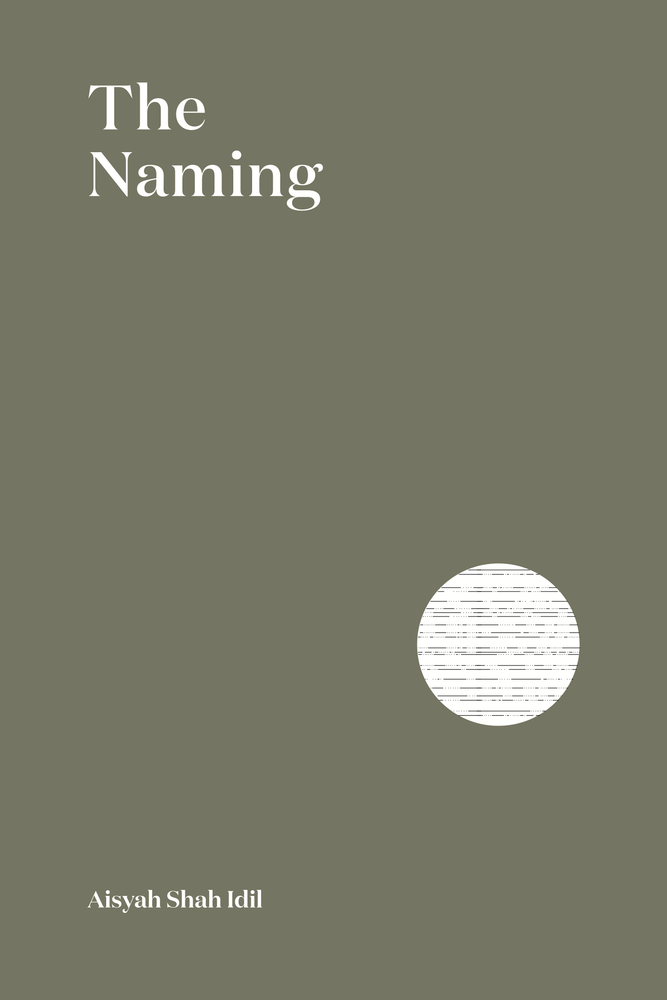
Girls and Buoyant by Emily Crocker
Subbed in, 2017
Parenthetical Bodies by Allison Gallagher
Subbed in, 2017
The Naming by Aisyah Shah Idil
Subbed in, 2017
I am always struck by the immense variability of human experience; the little and big differences that amount to the conditions of our individual and collective identities. The task of poetry is to write this nebulous, subjective humanity, while also probing the inefficiencies of the language we have to create and understand something so frustratingly out of grasp. How to apply an ostensibly tangible tool to an intangible quality? For instance, if we write emotion, or an emotion, as a word, it becomes incased in the materiality of language, becomes material itself, and is removed from the intangibilities of its initial feeling. Feeling is of course still there, but its nuance is limited to the shape and familiarity of the word, to the different ways we know the word in our different real world encounters.
As poets, we can attempt to challenge this materiality to better align the word with the unspoken aspects of human experience: we can disjunct, blot, disperse, misspell, reduce to phoneme and sound, scribble in illegible handwriting, feed poetry through a computer, or create a language. But our language, along with the words, letters and sounds that feed it, remain tied to the world we experience, for it is through these objects that we can know and create the world. Poetry uses these tools, cognisant and embracing of their limitations, to examine our identity and place within the world.
Three new chapbooks published by the independent literary organisation, Subbed in, provide acute examples of newish, young poets trying to come to grips with this task of poetry in a time when language has become a noticeably loaded vessel of opinion and feeling. The Naming by Aisyah Shah Idil, Parenthetical Bodies by Allison Gallagher and Girls and Buoyant by Emily Crocker, all present a poetics of identity through the scope of the modern world they have evolved and exist within. Idil can hear an ‘adhan blaring / in a full train carriage, / a work meeting, an elevator’ whilst searching for a mobile phone, and Crocker complains about EFTPOS minimums. Gallagher, presumably responding to an internet meme or video, writes, ‘right now / i am a dog wearing sunglasses,’ capturing ideally the weightless aspect of being one can suffer when head deep in a social media sinkhole. Indeed, when so much communication occurs via the type of an email, instant message, Facebook update, Instagram hashtag or Tweet, what then happens to our language and our ability to decipher its meanings? At times, I cannot help but feel that the act of literary interpretation and analysis is today at an all-time premium. Who hasn’t slaved over the meaning of a message; been infuriated by a troll; laughed at a well-worded meme; wondered at the legitimacy of a Facebook update? As Gallagher writes in ‘something that resembles everything’: ‘let’s invent new languages out of old worlds, / freely broadcast its cacophony.’ Even the chapbook form appears to encapsulate digitally limited forms of expression – where 140 characters can make a president – that nonetheless carry almost infinite meanings and permutations in the action of expression itself. I can consume a chapbook the same way I would a text message; in an inhalation, followed by a retrospective curiosity of what its phrasing actually meant.
Yet, in particular, all three books examine concepts of femininity, shaped by the experiences the poets allow to peep through their poetry. How they write their femininity is unique to the style and personal history / moment / identity of each poet. They write it bodily, emotionally, via social media, dualistically, intellectually, through other people, about other people, against and with masculinity, in relation/distance to motherhood, about themselves, ideal and not – ‘she imagines something graceful / lying dormant under her skin’ (Gallagher, ‘Promise’). On one hand, Idil, writing so often of her mother and family, muses in ‘Flagbearer’: ‘I will be your woman/bearer // wombs moulded by // the pomegranate heads of babies’; while, on the other, Crocker, who is fascinated by the raw shape of things, describes her ‘lumpy forehead. The slots / between my lanky toes / seized by chunky joints’ (‘Gaps’). The female body is a subject, divested of the object words we use to describe. As Crocker wryly writes in ‘Fruit,’ ‘The quack mistook you for a boy,’ and it is through such misapprehensions that the poets can come to know their own characters, personalities, biology, whatever aspect gives them identity. Crocker continues later in the same poem, ‘That night, / my skull on your breastbone, our uteruses lay / back to back in begrudged silence at the / suggestion they should be in time now,’ and lays claim to her individuality, particularly within an implied sisterhood.













